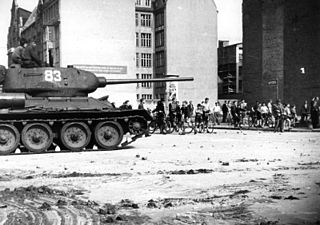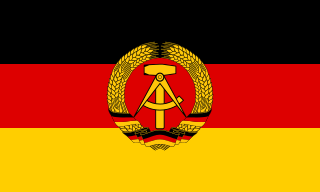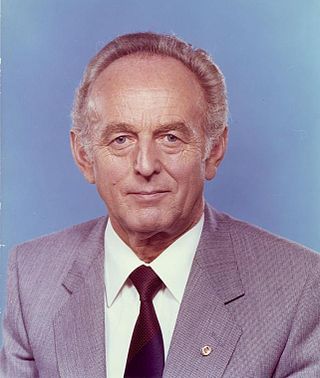
East Germany, officially known as the German Democratic Republic, was a country in Central Europe from its formation on 7 October 1949 until its reunification with West Germany on 3 October 1990. Until 1989, it was generally viewed as a communist state and described itself as a socialist "workers' and peasants' state". The economy of the country was centrally planned and state-owned. Although the GDR had to pay substantial war reparations to the Soviets, it became the most successful economy in the Eastern Bloc.

Erich Ernst Paul Honecker was a German communist politician who led the German Democratic Republic from 1971 until shortly before the fall of the Berlin Wall in November 1989. He held the posts of General Secretary of the Socialist Unity Party of Germany (SED) and Chairman of the National Defence Council; in 1976, he replaced Willi Stoph as Chairman of the State Council, the official head of state. As the leader of East Germany, Honecker was viewed as a dictator. During his leadership, the country had close ties to the Soviet Union, which maintained a large army in the country.

Walter Ernst Paul Ulbricht was a German communist politician. Ulbricht played a leading role in the creation of the Weimar-era Communist Party of Germany (KPD) and later in the early development and establishment of the German Democratic Republic. As the First Secretary of the Socialist Unity Party from 1950 to 1971, he was the chief decision-maker in East Germany. From President Wilhelm Pieck's death in 1960 on, he was also the East German head of state until his own death in 1973. As the leader of a significant Communist satellite, Ulbricht had a degree of bargaining power with the Kremlin that he used effectively. For example, he demanded the building of the Berlin Wall in 1961 when the Kremlin was reluctant.

The Socialist Unity Party of Germany was the founding and ruling party of the German Democratic Republic from the country's foundation in 1949 until its dissolution after the Peaceful Revolution in 1989. It was a Marxist–Leninist communist party, established in 1946 as a merger of the East German branches of the Communist Party of Germany and Social Democratic Party of Germany.

The original Constitution of East Germany was promulgated on 7 October 1949. It was heavily based on the Weimar Constitution and nominally established the GDR as a liberal democratic republic. In 1968, the East German government adopted a new, fully Communist constitution that was based on Marxism–Leninism, political unitarism, and collective leadership. There were further amendments to the 1968 constitution in 1974. With the political events of 1989, there were attempts to draft a new constitution for East Germany, but these efforts never materialized due to the dissolution of East Germany and the accession of its states into the neighboring Federal Republic.

The East German uprising of 1953 was an uprising that occurred in East Germany from 16 to 17 June 1953. It began with strike action by construction workers in East Berlin on 16 June against work quotas during the Sovietization process in East Germany. Demonstrations in East Berlin turned into a widespread uprising against the Government of East Germany and the Socialist Unity Party the next day, involving over one million people in about 700 localities across the country. Protests against declining living standards and unpopular Sovietization policies led to a wave of strikes and protests that were not easily brought under control and threatened to overthrow the East German government. The uprising in East Berlin was violently suppressed by tanks of the Soviet forces in Germany and the Kasernierte Volkspolizei. Demonstrations continued in over 500 towns and villages for several more days before eventually dying out.

Wilhelm Stoph was a German politician. He served as Chairman of the Council of Ministers of the German Democratic Republic from 1964 to 1973, and again from 1976 until 1989. He also served as chairman of the State Council from 1973 to 1976.
These are lists of political office-holders in East Germany. The political leadership of East Germany was distributed between several offices. However, until the Volkskammer removed a section in the GDR's constitution guaranteeing their monopoly on political power on 1 December 1989, the Socialist Unity Party of Germany (SED) held ultimate power and authority over state and government. Thus, the head of the SED's Politburo of the Central Committee was the de facto leader of the country.

The economy of the German Democratic Republic was a command economy following the model of the Soviet Union based on the principles of Marxism-Leninism. Sharing many characteristics with fellow COMECON member states — the East German economy stood in stark contrast to the market and mixed economies of Western Europe, including West Germany. The state established production targets, set prices, and also allocated resources, codifying these decisions in comprehensive plans. The means of production were almost entirely state-owned. The GDR had an above-average standard of living compared to other Eastern Bloc countries or the Soviet Union, and enjoyed favorable duty and tariff terms with the West German market; in 1989, it was estimated that 50 to 60% of its trade was with Western countries. However by the mid-1980s its economy had reached a state of stagnation, contributing to the process of German reunification.
The German Democratic Republic was created as a socialist republic on 7 October 1949 and began to institute a government based on the government of the Soviet Union during the Stalin era. The equivalent of the Communist Party in East Germany was the Sozialistische Einheitspartei Deutschlands, which along with other parties, was part of the National Front of Democratic Germany. It was created in 1946 through the merger of the Communist Party of Germany (KPD) and the Social Democratic Party of Germany (SPD) in the Soviet Occupation Zone of Germany. Following German reunification, the SED was renamed the Party of Democratic Socialism (PDS), which eventually merged with the West German Electoral Alternative for Labor and Social Justice to form the modern Left Party.
The New Economic System, officially the New Economic System of Planning and Management, was an economic policy that was implemented by the ruling Socialist Unity Party (SED) of the German Democratic Republic (GDR) in 1963. Its purpose was to replace the system of Five-Year Plans which had been used to run the GDR's economy from 1951 onwards. The System was introduced by Walter Ulbricht to try to improve the performance of the existing central planning, so that the economy might be run in as efficient a manner as possible.

The German Democratic Republic (GDR), German: Deutsche Demokratische Republik (DDR), often known in English as East Germany, existed from 1949 to 1990. It covered the area of the present-day German states of Mecklenburg-Vorpommern, Brandenburg, Berlin, Sachsen, Sachsen-Anhalt, and Thüringen. This area was occupied by the Soviet Union at the end of World War II excluding the former eastern lands annexed by Poland and the Soviet Union, with the remaining German territory to the west occupied by the British, American, and French armies. Following the economic and political unification of the three western occupation zones under a single administration and the establishment of the Federal Republic of Germany in May 1949, the German Democratic Republic was founded on 7 October 1949 as a sovereign nation.

The National Defense Council of the German Democratic Republic was created in 1960 as the supreme state body of the German Democratic Republic in charge of national defense matters, including mobilization planning. The NVR held the supreme command of the GDR's armed forces, and the NVR's chairman was considered the GDR's commander-in-chief.

Throughout their existence East Germany and the Soviet Union maintained close diplomatic relations. The Soviet Union was the chief economic and political sponsor of East Germany.

Ingeburg "Inge" Lange was an East German politician.

Gerhard Schürer was a leading politician in East Germany.

Main Task was the economic policy proclaimed in the German Democratic Republic during the Eight SED Congress in June 1971, and aimed at increased production of consumer goods for the population and to increase its material well-being in order to provide a higher standard of living for the population. The policy's official goal was "raising the people’s material and cultural standard of living on the basis of a fast developmental pace of socialist production, of higher efficiency, of scientific-technological progress and the growth of the productivity of labour". Or in the official formulation - to achieve "unity of economic and social policy". Between 1971 and 1982 the GDP of the GDR grew at average 5% annually, however the pursued policy only increased the state's debts and by 1982, GDR was nearly insolvent. This change of policy was greatly influenced by the 1970 Polish protests which led to greater emphasis on consumer goods and welfare policies in the entire Eastern Bloc.

The Foreign policy of East Germany was characterized by the close ties of East Germany to the Eastern Bloc. During its existence, the most important partner was the Soviet Union (USSR), which acted as a protecting power and most important trade and economic partner, which is why the GDR was often called a satellite state. The GDR remained closely linked to the other socialist states through organizations such as the Warsaw Pact and Camecon. While the GDR was relatively isolated outside the communist world in the first two decades of its existence due to the Hallstein Doctrine of West Germany, a change took place in the 1970s with the rapprochement with West Germany under Chancellor Willy Brandt's new Ostpolitik. As a result, the GDR was able to gain international status and establish diplomatic relations with almost 130 countries. While the Marxist-Leninist state ideology played a major role in the foreign policy of the East German government, it was however also influenced by their own economic and political interests. From the 1970s onwards, the GDR increasingly emancipated itself from the Soviet Union and pursued an independent policy towards West Germany, as loans from the West had become vital for the GDR's survival. In the 1980s, Erich Honecker refused to implement liberalizing reforms, which alienated the GDR from the USSR under Mikhail Gorbachev. After the revolutions of 1989, the Eastern Bloc collapsed and Germany was reunified, ending the period of an independent East German foreign policy.

Herbert Häber was a German politician and party functionary of the Socialist Unity Party (SED).

Horst Schumann was a German politician and functionary of the Free German Youth (FDJ) and the Socialist Unity Party (SED).
















